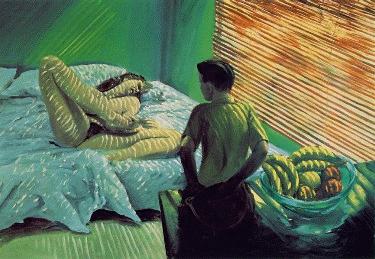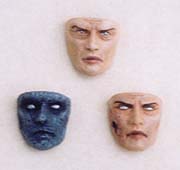Most
instructors would not consider themselves analysts or their students analysands—and
just as many would not even want to. Yet the cathartic nature of the
student-centered composition class makes us so,  whether
we like it or not. But this is a good thing. A leveled dialectic
typically transpires in Composition 101, and students eventually enact their
own "alienation, anxiety, shame, desire, symptom" (Bracher 123) through
writing and discussions. We frequently transcend the institutionalism
found in other departments, in other disciplines when we take on the discourse
of the Analyst and ask students to reconsider their sense of self and the
source of their ideas; most instructors in other disciplines perpetuate
that of the Master. The discourse of the Analyst enables the analysand/student
to communicate that which has been beyond symbolization—the manufactured,
unspeakable desires of the Other. Lacan's genius, whether
we like it or not. But this is a good thing. A leveled dialectic
typically transpires in Composition 101, and students eventually enact their
own "alienation, anxiety, shame, desire, symptom" (Bracher 123) through
writing and discussions. We frequently transcend the institutionalism
found in other departments, in other disciplines when we take on the discourse
of the Analyst and ask students to reconsider their sense of self and the
source of their ideas; most instructors in other disciplines perpetuate
that of the Master. The discourse of the Analyst enables the analysand/student
to communicate that which has been beyond symbolization—the manufactured,
unspeakable desires of the Other. Lacan's genius,  of
course, is that he bridges psychoanalysis and Marxism, and we discover that
the veiled origins of these desires are the culture industry as well as
the nuclear family. If Giroux is correct and "[c]ritical pedagogy needs
to develop a theory of educators and cultural workers as transformative
intellectuals who occupy specific political and social locations" (Border
78), then such theorizing will certainly benefit from the reflexivity drawn
from an analysis of the posthuman condition—accomplished simply through
peer review of a hypertext essay. Richard Benjamin, our Westworld
vacationer, might have benefited, too, had he chosen cybernetics instead
of androids, his first gamble. of
course, is that he bridges psychoanalysis and Marxism, and we discover that
the veiled origins of these desires are the culture industry as well as
the nuclear family. If Giroux is correct and "[c]ritical pedagogy needs
to develop a theory of educators and cultural workers as transformative
intellectuals who occupy specific political and social locations" (Border
78), then such theorizing will certainly benefit from the reflexivity drawn
from an analysis of the posthuman condition—accomplished simply through
peer review of a hypertext essay. Richard Benjamin, our Westworld
vacationer, might have benefited, too, had he chosen cybernetics instead
of androids, his first gamble. |
 whether
we like it or not. But this is a good thing. A leveled dialectic
typically transpires in Composition 101, and students eventually enact their
own "alienation, anxiety, shame, desire, symptom" (Bracher 123) through
writing and discussions. We frequently transcend the institutionalism
found in other departments, in other disciplines when we take on the discourse
of the Analyst and ask students to reconsider their sense of self and the
source of their ideas; most instructors in other disciplines perpetuate
that of the Master. The discourse of the Analyst enables the analysand/student
to communicate that which has been beyond symbolization—the manufactured,
unspeakable desires of the Other. Lacan's genius,
whether
we like it or not. But this is a good thing. A leveled dialectic
typically transpires in Composition 101, and students eventually enact their
own "alienation, anxiety, shame, desire, symptom" (Bracher 123) through
writing and discussions. We frequently transcend the institutionalism
found in other departments, in other disciplines when we take on the discourse
of the Analyst and ask students to reconsider their sense of self and the
source of their ideas; most instructors in other disciplines perpetuate
that of the Master. The discourse of the Analyst enables the analysand/student
to communicate that which has been beyond symbolization—the manufactured,
unspeakable desires of the Other. Lacan's genius,  of
course, is that he bridges psychoanalysis and Marxism, and we discover that
the veiled origins of these desires are the culture industry as well as
the nuclear family. If Giroux is correct and "[c]ritical pedagogy needs
to develop a theory of educators and cultural workers as transformative
intellectuals who occupy specific political and social locations" (Border
78), then such theorizing will certainly benefit from the reflexivity drawn
from an analysis of the posthuman condition—accomplished simply through
peer review of a hypertext essay. Richard Benjamin, our Westworld
vacationer, might have benefited, too, had he chosen cybernetics instead
of androids, his first gamble.
of
course, is that he bridges psychoanalysis and Marxism, and we discover that
the veiled origins of these desires are the culture industry as well as
the nuclear family. If Giroux is correct and "[c]ritical pedagogy needs
to develop a theory of educators and cultural workers as transformative
intellectuals who occupy specific political and social locations" (Border
78), then such theorizing will certainly benefit from the reflexivity drawn
from an analysis of the posthuman condition—accomplished simply through
peer review of a hypertext essay. Richard Benjamin, our Westworld
vacationer, might have benefited, too, had he chosen cybernetics instead
of androids, his first gamble.